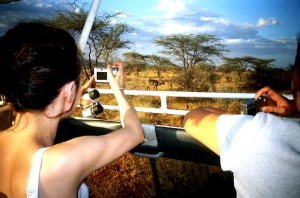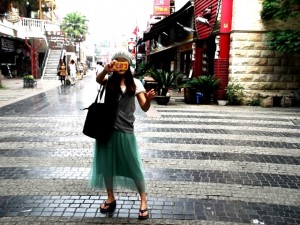When Photos of Life Become Photos as Life: Lessons for Job and Life Searches

In the midst of this, I’ve noticed that despite whatever obvious differences and contrasts there are between moderntravelsearches and modern employment searches, there is a disturbing similarity between them: All too often, both replace experience with documentation of experience.
By this I mean that just as (taking) a photograph is increasingly becoming a substitute for, rather than merely a record of, the experience of a place or situation, various aspects of employment searches are becoming substitutes for job or candidate experience rather than merely documentation of them.
Perhaps the clearest example is the resume. Like a photograph, it should be a record of experience that others can look at to get an informed grasp of and feel for what is encapsulated by it.
But in these tough times, all too many job seekers are spending too much time churning out resumes in numbers rivaling the photo count in a typical digital camera, instead of having more of the kinds of lived experience(s) that resumes, like photographs, are supposed to document.
The Photo ofExperience vs. The Photo as Experience
Having spent time in 48 countries, I’ve taken tens of thousands of photos, with about 25,000 in my road computer. That’s a lot and maybe already too many, even though some of them end up in my articles and professional portfolio. I say “too many” not only because of the challenge of keeping track of and sorting them all, but also because at some point, taking too many photos can make them become “photos as life” rather than a “photos oflife” (or “the photo as experience” rather than “the photo ofexperience”).
Just as too much travel is morphing into taking, saving, printing, emailing and looking over travel photos, for many frustrated job seekers work experience is being transformed into writing, printing or emailing resumes about work experience, in both instances, as pale color-enhanced shadows of the real thing.
With photography, when that happens, my, our, photographs of the Great Wall of China or the Pyramids of Egypt cease to be recordsof our experience of these wonders, but instead morph into substitutes for them—for what should have been informed, explored, emotionally rich, interwoven experiences (we should have had before, during or after snapping those shots).
Instead, we end up with documentation as proof of travel and bragging rights about the documentation, without ever having really immersed ourselves or cared enough to truly fathom where we have been and what we have beheld or could have felt (“What happened to the gleaming polished limestone facings of the Pyramids? Is there any evidence that they were ET spacecraft navigational guide-stones? What were the compelling reasons to build them? How do I feel being here? How do the locals feel about the pyramids’ being there?”).
Analogously, when all of a job seeker’s time is, of necessity, spent documenting jobs rather than having one, his or her professional experience becomes assembling, editing and reviewing proof of professional experience, rather than having the experience itself. The job has become production of proof of a job history.
Proof of Unimportant Experience
Worse, we often photograph things we in fact have absolutely no interest in, e.g., a solitary felucca (the traditional Egyptian sailboat) anchored in the Nile. I have no interest in sailing or fishing whatsoever, but will take that photo, because we don’t see boats like that in bays like that every day, so others will think I’ve been so lucky to have glimpsed something so special.
Do we prepare for or follow up on that boat photo with deep curiosity about their design, construction, history, uses or legacy? Of course not. The interest is captured by and exhausted in that single photo. End of the boat’s story and our curiosity.
The parallel in the modern resume is inclusion of things in which the job or M.B.A. program applicant really has no interest, but has called attention to just because it will impress the resume reader, e.g., “concurrently worked as team leader in lawn-mower telephone sales while completing my B.A. in economics”
Experience Sacrificed and Faked for Its Documentation
Then there is the reverse and often awful case of sacrificing the real or deeper emotional or moral significance of the moment just to take a photo of it.
For example, when passersby photograph a homeless person rather than help out, or snap a picture of an assault they never report or try to stop. Indeed, as in the case of the 2011 Vancouver hockey riots, the incident may be incited by those taking photos, just for the sake of the “special” photos.
In the employment arena, a parallel case would be soliciting or accepting resumes that are never seriously or sympathetically reviewed, and in no way for the benefit of the applicant, e.g., only for market research or other data mining.
The parallels do not end there: Just as we contrive and select our photo subjects to maximize their impact, when job hunting, we skillfully edit our lives and credentials for the same purpose, omitting mention in a resume of that short-term dead-end job in the auto-parts store that we quit, edited out like rubbish bins next to the Sphinx we photographed.
So, just as our modern photos usurp our experiences (and indeed, in the taking,become our experiences) and as we edit, stage or at least contrive, if not outright fake them, creating and submitting resumes now usurps and contrives the work and life experience of many job seekers forced into that situation.
Trivializing Experience by Recording It
Another analogy between searching for more photo ops and searching for more candidates or jobs is that as the photos and resumes collected, reviewed or submitted pile up, they gradually become trivialized by their own numbers and disconnect with immediate experience.
In a kind of dis-synergy, they collectively start to invalidate the individuals (even in their own estimation), the experiences and details they were supposed to celebrate and record (as “special”), rather than replace and trivialize them.
There seems not to be so great a difference between showing hundreds of photos to eyes-glazed-over friends and reading or showing hundreds of resumes to or for clients: In the end, not only do the travel photos and employment resumes have to stand in for what they presumably captured, they also ultimately replace and reduce them to the commonplace—another instance of documentation as life, instead of documentation of life.
The Wisdom of Professional Photographers and Resume Writers
Photographs of life are a life of photographs for professional photographers, but in a much more positive way than for scrambling tourists disgorged on cue from a tour bus for that obligatory hurried, uninterpreted, unreflective snapshot of the whatever.
Unlike the tourists, the photographer is keenly aware of and respectful of the distinction between photographic realism and idealism and the correlative distinction between photography for informative, often cautionary instruction (realism) and photography for inspiration (idealism). A good photographer will balance both of these.
The superficial tourist, on the other hand, is all too content to contrive an idealized perfect photo to palm off as the real deal, often only for the bragging rights that come with being a witness to such bogus, edited “perfection”. That shortcoming is shared with the rigged-resume, stripped of any candid realism, e.g., in the form of admitted personal or professional shortcomings.
Moreover, the professional photographer manages to blend immersion in the subject photographed with skillful observation and mastery of it, much as a professional resume writer can relate to and capture the essence of a job seeker’s professional real experience, inspirations and ideals by blending professional detachment with empathy for the job-seeker.
Three Lessons
In both instances, there are three things these pros understand better than the superficial photo-snapping tourist, resume skimmer or any of the documentation obsessed.
The first is that, like the unexamined life that is not worth living, the unexamined photo and resume are worth less (if not worthless). Informed reflection and “care” in both senses of the term are more important than empty bragging rights.
The second is that unless taking and making these are indeed one’s profession, one’s avocation and calling, they should capture and enhance one’s life experience, not replace it. The unemployed forced to write resumes instead of perform the jobs they target deserve the greatest sympathy and support of their efforts.
The third is that taking photos and writing resumes should occupy most of your time only if either of these is, in fact, your full-time job.
…your full-timepaid job.
Image: PHOTO AS SAFARI EXPERIENCE/Photo: Michael Moffa


